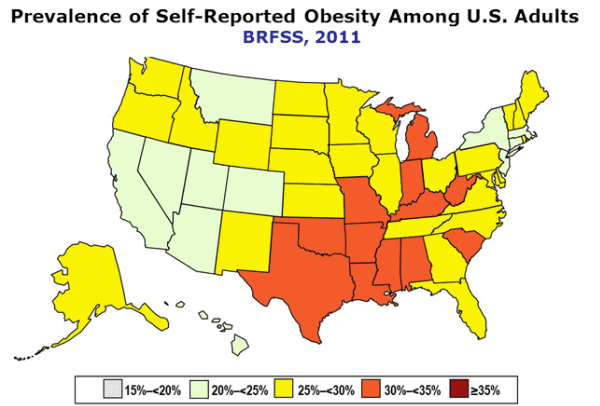The Centers for Disease Control and Prevention released new frightening statistics for the obesity rates across the country. Obesity rates in America are climbing rapidly, with an estimated 35.7% of the adult population classified as such. The South has the highest obesity rate and the Midwest is right behind them. Citizens living in Northeast and West have the lowest obesity rates.

As reported by BizJournal.com, Massachusetts is the third lowest obesity rate state. However, Massachusetts should not celebrate their bronze medal in these results. Massachusetts may have a low obesity rate compared to 47 states, but that does not mean there isn’t a problem internally with the state. One-third of Massachusetts children and two-thirds of the adult population are either obese or overweight.
Cheryl Bartlett, director of the Massachusetts Bureau of Community Health and Prevention, speaks out on the state’s health issue. “On a national level, (Massachusetts) looks pretty good. But we’ve got a long way to go.” Bartlett and her organization have a goal for the state of Massachusetts. They want to see obesity levels decrease by 5% within the next 15 years. Plus, a reduction in type 2 diabetes and high cholesterol cases. However, no specific plan to reach that was shared.
Diabetes and high cholesterol are only two obesity related diseases. High blood pressure of overweight and obese people spike up and the likelihood of a heart attack and stroke increase. Difficulty of performing physical activity increases, and obese individuals find it hard to walk or run a short distance. The body of an overweight individual experiences more pain in the knees and back than a healthy person. This is a short list of the many pains, diseases, and limitations that afflict the obese.
Adults and children of Massachusetts who are overweight and obese have to be willing to commit to a lifestyle change. The process of implementing a diet, meal, and behavioral change can take years, depending on circumstances. Overweight and obese adults will have to lose 5 to 10 percent of their weight to help the state’s standings drop. Parents will have to help children eat healthier and become more physically active.
There is no clear strategy as of right now of how Bartlett and her organization plan to lower Massachusetts’ obesity rates.
Also Read:
Coffee Healthy Enough to Be a Prescription Not Quite
Michael Strahan Named Ripa’s New ‘Live’ Co-Host: Is He Fit Enough for the Job?
